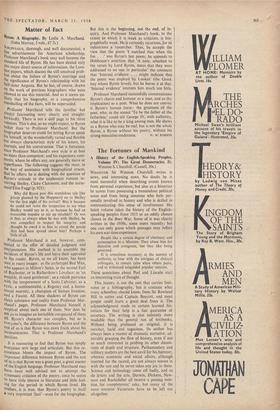Matter of Fact
Byron: A Biography. By Leslie A. Marchand. (John Murray, 3 vols., £7 7s.)
SCRUPULOUS, thorough, and well documented, a fine advertisement for American scholarship, Professor Marchand's book may well become the standard life of Byron. He has been denied only ,°11e major direct source of information, the Love- lace papers, which discuss the still unsolved prob- lem about the failure of Byron's marriage and the significance of Byron's relationship with his half-sister Augusta. But he has, of course, drawn on the work of previous biographers who were allowed to use this material. And so it seems un- likely that his biography, as a comprehensive Marshalling of the facts, will be superseded.
PrOfessor Marchand tells the familiar but alwdys' fascinating story clearly and straight- forwardly. There is not a chill page in his three volumes. This is due, as we might expect, to Byron r,ather than to Professor Marchand. But the olographer deserves credit for letting Byron speak for himself, in the wonderfully varied and flexible but always characteristic style of his letters, his journals, and his conversation. That is fortunate, since 'Professor Marchand's own style is at best no hibre than competent; and his expository com- ments, where he offers any, are generally naive or superfluous. The following suggests the most, in the way of assistance with biographical cruces, that he offers; he is dealing with the question of byron's attitude to the unpleasant rumour in- volving Shelley, Claire Clairmont, and the nurse- maid Elise Foggi (p. 921):
Why did Byron pass this scandalous tale [the gossip gleaned by the Hoppners] on to Shelley on the first night of his arrival? Was it because he could not resist the temptation to see what Shelley would say to it, or because he had an irresistible impulse to stir up mischief? Or was it that, as always when he was with Shelley, he was compelled to respect his integrity, and thought he owed it to him to reveal the gossip that had been spread about him? Perhaps a little of all.
Professor Marchand is not, however, com- mitted, to the .offer of detailed judgment and interpretation. His method is to assemble the incidents of Byron's life and leave their appraisal to the reader. Byron, as we all know, has been seen in many images : as the archetypal Bad Man, Who appears in Milton's Satan, in the second Earl of Rochester, or in Richardson's Lovelace; as 'an amiable, ill-used gentleman'; as a rakish patrician With the temperament of a Scots Calvinist; as a cynic, a sentimentalist, a Regency cad, a homo- sexual neurotic, a champion of human freedom, and a Fascist. All these shadows of Byron can Claim substance and reality from Professor Mar- Oland's. pages. Professor Marchand himself is sceptical about each one of them. Nor does he ask us to imagine an incredible compound of them all. Byron's character was complex, but so is everyone's; the difference between Byron and the rest of us is that Byron was more frank about his inconsistencies. That is Professor Marchand's Position.
It is reassuring to feel that Byron was simply everyman writ large and articulate. But this re- assurance blunts the impact of Byron, The iniPorlanl difference between Byron and the rest of us is that Byron was a great poet, a great master of the English language. Professor Marchand may have been well advised not to attempt the systematic criticism of the poetry, since he seems to have little interest in literature and little feel- ing for the period in which Byron lived. He realises, it is true, that Byron's poetry is itself it very important `fact'—even for the biographer. But this is the beginning, not the end, of in- quiry. And Professor Marchand's book, to the extent to which it is. weak as criticism, is bio- graphically weak. He is curiously incurious, for so industrious a researcher. Thus, he accepts the view that the poem 'I watched thee when the foe . . .' was Byron's last poem; he appends to Hobhouse's assertion that 'A note, attached to the verses by Lord Byron, states that they were addressed to no one in particular' the comment that 'Internal evidence . . . might indicate that the poem was inspired by Loukas' (the Greek boy whom Byron loved); but he leaves it at that. 'Internal evidence' interests him much too little.
Professor Marchand successfully communicates Byron's charm and humour as a man, and so (by implication) as a poet. What he does not convey is Byron's human force : the greatness of the poet, who, in the sonnet 'To be the father of the fatherless,' could tell George 1V, with authority, what it is like to be.a king among men. He shows us a Byron who may be real, but is not the whole Byron, a Byron without his poetry, without his strong masculine tenderness. w. w.' ROBSON


































 Previous page
Previous page